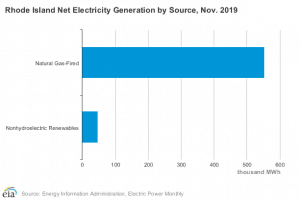Rhode Island Residential Electric Rates
The majority of Rhode Island is serviced by National Grid. Customers who do not shop for competitive rates pay a default rate known as the basic service rate. Rhode Island electricity choice allows customers to find a lower rate for electricity that will replace the basic service rate and result in electric bill savings.
Same Bill, Lower Rate
The basic service rate can be found on your electric bill, it includes generation and transmission charges. When you choose another electric supplier with a lower rate, you will still get the same bill from your current utility with the lower rate replacing the default rate. The electric bill from your utility will state your electric supplier underneath “Supplier Service Detail” followed by your kWh consumption and rate.
Rhode Island Energy Market Overview
Rhode Island is a state, full of contrasts. It is the smallest U.S. state by area and yet it is also the second-most densely populated. Though the average residential electricity rates that Rhode Islanders pay are among the highest in the country (21.94 cents per kilowatt-hour, compared to the US national average of 22.01 cents per kilowatt-hour), they also have the lowest per capita energy consumption in the US.
No wonder that the Rhode Island House of Representatives passed a bill in 2002 to establish a competitive electricity market to give its energy-efficient residents a break. Since then, Rhode Island households and businesses are able to shop for electricity rates from alternative energy suppliers, resulting in a lower electricity bill at the end of the month.
Comparing Electricity Rates in Rhode Island
To help Rhode Islanders learn about energy deregulation, the state government launched an official state program called Empower RI, where residents and businesses can compare regulated rates, mandated by the state utility company with competitive rates, offered by certified suppliers.
- Visit the Empower RI and select if you are shopping for residential or commercial rates
- Update the results with your average monthly usage
- Find a list of competitive energy suppliers and the available rates
Alternatively, you can compare electric rates in your area by simply entering your zip code on our website. We carefully review all electric suppliers to also include information about customer service contact details, bill payment options, and little extras that they offer to customers.
Why should you switch? For comparison, National Grid’s (RI energy utility) increased its electricity price to compare to 11.75 cents per kilowatt hour in 2021. If you shop for electricity rates in the competitive market place, you can find a number of providers with cheaper rates.
Utility Companies in Rhode Island

The biggest electric utility in Rhode Island is National Grid. Headquartered in London, National Grid is one of the largest “investor-owned” utility companies in the world, covering New York, New Jersey, and Rhode Island in the US. In Rhode Island, it supplies both electricity and gas to almost the entire state territory.
In January 2019, National Grid announced that it will be raising its standard electricity rate to 10.95 cents per kilowatt-hour.
- To reach out to a National Grid customer service team, you can dial 1-800-322-3223.
- For electric and gas emergencies, you can text the word OUT to 64743, or call 1-800-465-1212.
Energy Plans & Products in Rhode Island
Energy plans are like shoes. One size does not fit all. Navigating through complex information about electricity rates can be confusing and can ultimately deter you from shopping for a better deal. Below is all you need to know about the different energy products that energy companies offer to Rhode Islanders:
| Plan | Description | What's Good? | What's Bad? |
|---|---|---|---|
| Green / Renewable Energy | On this plan, your supplier will match the energy you consume by buying an equal amount from renewable generators |
|
|
| Prepaid | This plan lets you pre-purchase power for your home at a set price, like a prepaid cell phone |
|
|
| Variable Rate | Your per-unit gas and electricity costs can vary at the discretion of your supplier |
|
|
| Fixed Rate | Your unit price for gas and electricity will remain the same for the duration of the plan |
|
|
| Renewable Energy Credits (RECs) | By purchasing 1 REC, you purchase the environmental benefits of 1MWh of renewable energy generation | Reputational gains and compliance targets for businesses with a mandated renewable obligation | There are no real downsides -RECs are fairly cheap and the system is secured and tightly monitored. |
Alternative Energy Options in Rhode Island
Despite being a state with fairly low renewable energy penetration, Rhode Island is the first state to commit to being a 100% renewable state by 2030. As an environmentally-conscious Rhode Islander, you have a couple of options to green up:
 | Green energy plan - Some retail providers in Rhode Island offer at least one partially or fully renewable energy plan. With the green plans, the supplier pledges to buy Renewable Energy Certificates or RECs, from a generator that produces power from renewable sources, such as wind. Enter your zip code to see the available green energy plans. |
 | Community renewables program - A community solar project is a large solar farm shared by more than one household. On a first-come, first-served basis, Rhode Island offers an incentive program in the form of bill credits to community solar developers who will pass on the grants to subscribers. |
 | Energy efficiency programs for farms - Rhode Island farmers can benefit from various incentives and free energy-efficiency resources and tools, such as Environmental Quality Incentives Program (EQIP), EPA Portfolio Manager or Farm Energy Efficiency Program (FEEP). |
FAQs
Below are answers to some of the questions you might have about Rhode Island electricity rates:
Where does Rhode Island get its electricity?
Rhode Island generates a larger share of its electricity from natural gas than any other state. In 2018, natural gas fueled 93% of Rhode Island’s electricity net generation. The remaining 7% of electricity is generated from renewable sources.

What is National Grid’s current rate?
Since January 2021, the National Grid’s Price to Compare for electricity has been 11.75 cents per kilowatt-hour. You can find cheaper electricity rates in Rhode Island by shopping around.
How much does Ambit Energy Cost?
The electricity rates offered by alternative energy providers, such as Ambit Energy depend on multiple factors, for example, your average energy usage.
Rhode Island might be the smallest state in the US, but it certainly isn’t short of opportunities when it comes to preserving energy and reducing your electric bill. Enter your zip code and compare available electricity rates in your area – you might find a deal worth switching for.
Updated on
